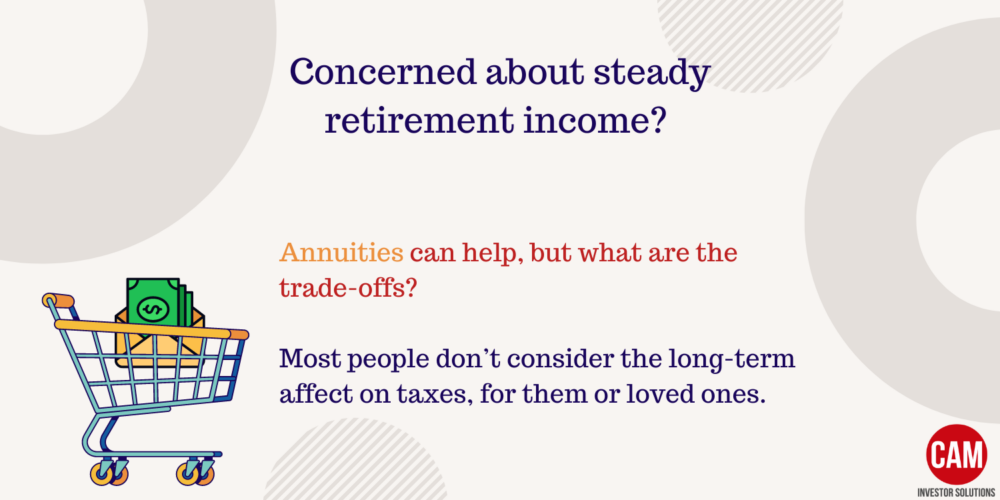If something happens to you, does your family know all your passwords and assets? Create your estate folder today. Here's a list.

Avoiding Inheritance Mistakes
Today people are living longer than any generation before us. But is that necessarily a good thing? Sometimes we mistake quantity for quality. Would you rather have 20 really enjoyable years in retirement or 30 years of retirement with so-so health and possibly less means? This is a deeply personal question that will be different for everyone. The only “right” answer is the one that makes you most satisfied with your life. And with either choice, you may not expend all your wealth or assets and they can’t go with you. So what do you do with them?
Even with medical and technological advancements, the inevitable will happen. We don’t like to think about the end of life, it can be uncomfortable and sad. However, not thinking about what happens beyond your life time can have unexpected consequences you certainly wouldn’t want. Will you leave behind loved ones? Maybe theirs a foundation or charity that’s meaningful to you. How can you prepare now, to ensure they are prepared to continue your wishes or good deeds?
Being prepared is the key to peace of mind.
By taking control of your assets today, you’re not only safeguarding your own financial well-being but also ensuring that your loved ones will be taken care of. It’s an act of love, really – one that showcases your thoughtfulness and consideration for those who matter most to you.
Don’t put your under aged kids or grandkids as your direct beneficiaries
Typically, if a child under 18 receives an inheritance, a guardian or trustee will be appointed to manage the inheritance on their behalf until they reach the age of majority. This can have very cumbersome effects on the guardian, as you can see below in this case study.
Case study: I worked with a woman after she lost her husband unexpectedly and they had a 3 year old daughter (it was a second marriage). The deceased husband wanted to earmark funds to go directly to the 3 year old, separate from his older grown sons. He named his underaged daughter as beneficiary on his retirement account. After he passed, the mom then had to bring statements to the court quarterly to show proof she was acting in the child’s best interest. This could all have been avoided. Had they worked with an estate planning attorney, they could have set up proper paperwork to carry on their wishes in the easiest way possible.
Don’t have accounts spread out everywhere
It’s easy to look around one day and realize you have several accounts scattered everywhere. Many times I’ve met with new clients and a common phrase I hear is ‘I have a lot of things all over the place, I’m not even sure if I know where they all are’. They may have several bank accounts, especially as people have bought CDs and other short term investments for their cash. Not to mention moving employers and leaving your 401k or retirement plan behind. Soon, a few years becomes a couple of decades, and there can be a lot of accounts.
Case study: One person I met with was getting ready for retirement and he still held individual stocks and funds all directly with the company. I think we totaled over 30 institutions. We began to walk through what it looks like when someone dies. There are a lot of things to go through and process. For starters, you have to get a death certificate sent to each company where the deceased had an account. Then you have to go through a settlement process with each of them. It’s a long and complex process with even 2-3 companies, but the workload piles up quickly for each institution. In the case of my client with 30 accounts? When I informed his wife what the process would look like for her to settle his estate, she was overwhelmed by the idea of having to deal with this process.
I have walked many widows and widowers through this process over the years. Often times grieving partners just need help getting organized. Additionally, having a professional call the different institutions with them can be very comforting and helpful. In my experience, it is hard enough to lose a loved one and spend time grieving their loss, you need every resource available to make the business of leaving assets easier.
Failing to seek counsel from an estate planning attorney
So many little details can be overlooked. The case study of the under aged daughter is a perfect example. A simple overlooked asset or account titling can ultimately make life more complicated when dealing with the loss of a loved one. A good estate planning attorney can help to identify and solve these problems. While this seems like a task only the wealthy or elderly should consider, that couldn’t be farther from the truth. As soon as you have any money saved, tangible possessions and/or have a family – you should meet with someone who can help you with a:
- Will
- Guardianship
- Healthcare power of attorney
Don’t know where to go for these services? Start with your employee benefits. Many times employers will offer a low-cost legal service you can add on. For a small monthly fee you can access a legal team to help prepares these documents. Have more complicated assets, property, family dynamics? Seek out a trusted estate planning attorney in your area. Interview several and ensure the one you select can help with your specific needs. This is the most valuable gift you will be giving your self and your family.
Once you have your ‘ducks in a row’ as they say, you now need to tell someone about it! I have recommended to my clients over the years to put together an ‘Everything’ folder. This would have a summary of everywhere you have money, details about your property assets, wills or trust documents, life insurance policies and anything else that would help whomever you leave behind a way to move forward. I prefer a hard copy folder kept in a safe or locked file box, but if you prefer to keep it electronically, just be sure to provide that information securely with someone you trust.
I worked with a single elderly client for many years who had one heir, an adult son. The client passed unexpectedly and his family had no idea that he even had any assets. They found my business card on his refrigerator and when they called me I pointed them in the direction of the “Everything” file he made. While he personally did not get the opportunity to let them know where his file was, having it completed at least made the transition easier. Working with trusted advisors, whether that’s an attorney or a financial advisor, can provide peace of mind for yourself and your loved ones.
Disclosure
M & A Consulting Group, LLC, doing business as CAM Investor Solutions is an SEC registered investment adviser. As a fee-only firm, we do not receive commissions nor sell any insurance products. We provide financial planning and investment information that we believe to be useful and accurate. However, there cannot be any guarantees.
This blog has been provided solely for informational purposes and does not represent investment advice. Nor does it provide an opinion regarding fairness of any transaction. It does not constitute an offer, solicitation or a recommendation to buy or sell any particular security or instrument or to adopt any investment strategy.
Past performance is not a guarantee of future results. Diversification does not eliminate the risk of market loss. Tax planning and investment illustrations are provided for educational purposes and should not be considered tax advice or recommendations. Investors should seek additional advice from their financial advisor or tax professional.



